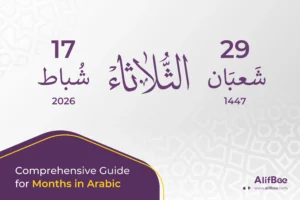How to Speak Arabic Fluently: 10 Practical Tips That Actually Work
If you’ve been learning Arabic for a while — maybe months, maybe years — and you still feel nervous speaking, you’re not the only one. Many learners, even those who grew up hearing Arabic at home, find it tricky to turn words and grammar into real, flowing conversation.
Speaking Arabic fluently isn’t about not making a single mistake or knowing every word in the dictionary. It’s about being able to express yourself, even if it’s not perfect, and learning from the little errors you make. The more you practice — and enjoy the process — the faster you’ll improve.
In this article, we’ll share 10 practical tips on How to Speak Arabic Fluently. They’re based on years of teaching and solid language-learning research. Whether you’re just starting from scratch or bringing back the Arabic you knew as a child, these tips will help you speak Arabic fast with more confidence and have fun along the way.
What Does “Fluent in Arabic” Actually Mean?
Most people think that being fluent is speaking native perfect Arabic with no pause and no mistakes. But that’s not actually fluency. The American Council on the Teaching of Foreign Languages (ACTFL) further specifies that fluency is being able to communicate effectively and freely in real-life circumstances, even unexpected ones.
When ACTFL assesses fluency in their Oral Proficiency Interview, they aren’t simply evaluating how perfect your grammar is. Instead, they are determining if you are able to give your ideas, comprehend the speaker, and sustain a conversation.
So if you can express what you mean, understand the reply, and keep talking—even if you make mistakes—you’re already on the road to fluency. Think of fluency as a scale you move along over time. Don’t wait for perfection; focus on being understood first, and polish your skills as you go.
Why Speaking Arabic Daily Is More Powerful Than Studying Alone
Studying Arabic is important, but speaking is like a muscle; you have to use it every day if you want it to grow strong. If you only read or memorize rules, your “speaking muscle” doesn’t get enough exercise.
Research from Cambridge University Press found that short, regular speaking sessions help people learn a language much faster than long, occasional study sessions. Even 10–15 minutes a day can make a big difference. This is called “distributed practice,” and it works because your brain gets repeated chances to use and remember the language.
You don’t need to wait until you “know more” to start speaking. You can begin today—say good morning to yourself in Arabic, describe what you’re doing out loud, or repeat a phrase you’ve just learned. Every little bit of speaking adds up and pushes you closer to fluency.
10 Practical Tips on How to Speak Arabic Fluently
Tip #1 – Listen First: Train Your Ear Before Your Tongue
Fluency begins with listening. Before you can speak Arabic fast and smoothly, you need to get your brain used to the sounds, stress, and rhythm of Arabic. This is important because Arabic has special sounds — like ع /’ayn/ and غ /ghayn/ — and patterns of speech that English doesn’t have.
How to make your listening valuable:
- Try short, step-by-step audio lessons that you can follow easily.
- Watch TV shows or movies in the dialect you’re learning. Use subtitles at first, then replay without them to check how much you understand.
- Explore AlifBee Stories to hear Arabic in real situations and see how words work together in a sentence.
Remember to spend at least 10 minutes every day listening with focus, not just having Arabic in the background.
Tip #2 – Don’t Fear Mistakes: They’re Proof You’re Learning
To speak Arabic fast, keep in mind that mistakes aren’t something to avoid, they’re signs that you’re learning. Each time you slip up, your brain gets a chance to notice the problem and remember the right way for next time.
Start speaking as soon as you can, even if your words aren’t perfect yet. When someone corrects you, say the correct version right away and write it down in a small “mistake journal” so you can look back and fix it later.
Most native speakers will appreciate your effort much more than flawless grammar. In language learning, the courage to try is worth more than never making a mistake.
Tip #3 – Enhance Flow and Pronunciation Using Shadowing
Shadowing is very high on the list of simple methods for having you speak more naturally in Arabic. It is nothing more than listening to a native speaker and speaking along with them, doing your best to replicate their tone, rhythm, and pacing as accurately as possible.
That’s how you do it:
- Find a 30- to 60-second clip from a news piece, a podcast, or an episode of AlifBee.
Hear it once to know its meaning. - Replay once and describe in parallel with audio, referring to speaker rhythm, tone, and emotion.
- Make it a habit. Mix up voices and subjects so you’re not in one style only.
If you have a specific dialect in your mind—Egyptian, Levantine, Gulf—choose clips in that variety so your accent develops in the right direction.
Tip #4 – Think in Arabic: Don't Translate Everything
- Describe what you are doing in Arabic: “أنا أكتب مقالًا الآن” /Anā aktubu maqālan al-ān/ (I’m writing an article now).
- Name how you feel: “أنا جائع” / Anā jāʼiʻ/ (I’m hungry).
- When you look at an apple, skip the English step—just think “تفاحة” /Tuffāḥah/.
Tip #5 – Practice Arabic in Day-to-Day Situations
Arabic becomes much easier once you slip it into things you’re already doing. You don’t need to wait for a set study time, practice can happen in your kitchen, at the market, or even on your commute. This is one of the best tips you can get to speak Arabic fast.
Do this:
- List your shopping needs in Arabic, then read your list as you go shopping. (See Arabic Phrases for Shopping.)
- As you cook, mention each ingredient’s name in Arabic as you add each ingredient.
- Act like you are traveling—and order food, reserve a room, or get directions out loud. (See 25 Arabic Words and Phrases for Easy Travel.)
When you link new vocabulary to real actions, it sticks in your memory far better. That’s why everyday Arabic is such a powerful habit to build.
Tip #6 – Talk to a Partner (Even an AI One!)
You can learn individually, but speaking with another person propels your fluency much quicker. Actual conversations make you listen, process, and answer immediately, just like in real life.
You can:
- Take part in a free online language exchange to chat with native language speakers.
- Work with a tutor or coach. (See Why You Need an Arabic Language Coach Today.)
- Use the speaking tools or apps in the AlifBee App for speaking practice on-demand.
If you can’t talk regularly with someone, try this: record yourself speaking in answer to simple questions in Arabic, then listen back to your recordings. Before long, you’ll get a good idea of what works and what doesn’t.
Tip #7 – Study Phrases, Not Single Words
- Rather than simply “سعيد” /saʻydun/ (happy), learn “أنا سعيد بلقائك” /Anā saʻydun biliqāʼik/ (I’m happy to meet you). See Arabic Phrases to Express Happiness.
- Rather than simply “آسف” /Āsif/ (sorry), learn “آسف على التأخير” /Āsifun ʻalá alttaʼkhyr/ (Sorry for being late). Check out Arabic Phrases to Say Sorry.
Tip #8 – Keep Arabic Around You Everywhere
- Put labels on common objects—“باب” /Bāb/ (door), “نافذة” /Nāfidhah/ (window), “ثلاجة” /thalājah/ (fridge).
- Switch your phone, apps, and even GPS to Arabic.
- Subscribe to YouTube, TikTok, or Instagram content creators who create content you’re interested in already.
Tip #9 – Establish Measurable Speaking Goals
If you’ve ever promised yourself you’ll “speak Arabic fast someday,” you know how easy it is for that goal to fade away. The point is to make your target specific and measurable so you can actually see progress.
Think about something you can count and a date you can schedule. For example:
- By this month-end, I shall be able to conduct a 5-minute conversation in Arabic.
- In the following two weeks, I’ll learn 20 new expressions and put them to practical use in conversation.
Small objectives like these provide something to work for and something to be happy about when you reach them.
You can even use additional programs such as the AlifBee App to measure how much you’ve learned, how much you’ve practiced a day, and how much time you’ve spent speaking.
Tip #10 – Be Consistent: Fluency Grows with Repetition
If you’d like to know how long it takes to become fluent in Arabic then you need to realize that fluency isn’t built over a study weekend. It grows quietly, from the little things you repeat day after day.
Even 15 minutes of speaking time can get you further ahead than a weekly cram period. On your busiest days, tell yourself, “I’ll just say three sentences in Arabic today.” That’s enough to keep the chain unbroken.
Try to connect Arabic to things you already do. Play a quick podcast during your commute, review phrases as you prepare dinner, or talk yourself through your morning routine out loud in Arabic. It doesn’t ever feel like “studying,” and over weeks and months, those small moments turn into real progress.
Final word
So excellent learners, speaking fluently in Arabic isn’t only for “talented” people, it’s the result of regular, enjoyable practice.
With every greeting, sentence, or even error, you’ll be closer to your goal. And with the right tools like AlifBee, you can incorporate Arabic into your everyday life, measure your development, and stay motivated.
Don’t wait until you feel “ready”, start speaking today, even if it’s just simple phrases.
FAQs
That will depend upon your starting level, motivation, and exposure. The Foreign Service Institute (FSI) estimates 2,200 hours for an English speaker to reach proficiency, but you can be conversationally fluent much sooner if you practice speaking each day.
Yes. Many students begin with speaking, especially for travel or family discussion. However, reading and writing will enhance your knowledge and enhance your confidence as a speaker.
When studying for media studies or lit, you can start with MSA. For speaking in day-to-day conversation, choose a dialect nearest your experience (Egyptian, Levantine, Gulf, etc.). Some students choose a mix of both.
Shadowing, speaking as naturally as you can, and recording yourself are extremely helpful. Practicing speaking and listening each day will slowly develop your accent.
Use language learning apps, practice via online speaking clubs, listen to Arabic media, and practice speaking to yourself each day. Programs like AlifBee will help you immerse yourself regardless of your location.









